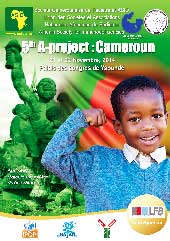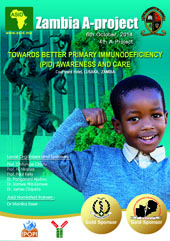Dr Erwa N H H1, & Prof Bousfiha A A2
1 Faculty of Medicine & Soba University Hospital, Khartoum, Sudan
2 Casablanca Children Hospital CHU Averroes & Medical School, King Hassan II University, Casablanca Morocco.
This is the first annual progress report on the A-project. It aims at summarizing the progress with the A-Project protocol and managerial issues as well as the meetings progress and the A-project outcomes:

Background:
The A-project concept was originally proposed by Prof Aziz Bousfiha during the first IPIC Congress in Estoril, November 2013. The original concept of this one day training programme was inspired by the European J Project but has been designed to suit African needs through training African health care professionals in the diagnosis and management of primary immunodeficiency states. As such a protocol that governs and guides the execution of this training programme was developed in December 2013 to guide the A-project. This protocol was gradually improved to meet the needs of the continent. Accordingly the following 2 main additions were made to the original protocol which assumed a unified level of training:
FIRST: that 3 levels of A Project shall be held to cope with different levels of expertise as follows:
- Level 1 (Primary): to cover the diagnosis area using ASID 10 recommendations. This is a level that is hoped to focus on general physicians, paediatricians and family doctors. It may also accommodate other health care professionals including biomedical scientists.
- Level 2 (Intermediate): to cover treatment and therapeutic options
- Level 3 (High): to cover the use of immunophenotypic classification (IUIS 2014) to guide all the possible diagnostic and therapeutic options.
SECOND:
In December 2014 the following addition was also added to the A-project original concept and design with the objective of ensuring that the programme is comprehensive enough to cover training in all areas of care to the highest possible standard within the limitations of health care provision in Africa. Thus the development of the following individually specialized A Projects has also been proposed:
- Med A-project for medical doctors (original protocol)
- Biol A-project for biomedical scientists (level 1 A project)
- Nurses A-project
- Training A-project.
Assessment of progress according to protocol with regards to managerial and organizational issues:
- So far A-project protocol seems to be working well in the following areas: the development of a standard programme, a summary that has been placed in the ASID website, collection of tools for training, naming of target countries and the number of A-project meetings held so far ( 5 meetings since March 2014, see table below).
- Satisfactory progress in the number of trainers, however, for increased efficiency more trainers are needed in different areas. This will reduce the burden on current trainers as well as the expenses of travel as more trainers are identified closer to training venues. Train the trainer workshops and short term fellowships are expected to help with this.
- Initial budget target of 2000 Euros (stated by the original A-project protocol) proved unrealistic especially in circumstances where more than one trainer is required. Increase the estimated budget to 5000 Euro seems to be more realistic with an improved chance for a surplus for ASID Newsletter, registry development and other ASID activities.
- Funding seems to be a major issue also partially due to difficulties with money transfer. Local fund raising per meeting depends to a large degree on the local organizers ability in recruiting funds for venue and local organization. Despite these difficulties, the meetings managed to progress with the available resources and support from drug industry and local organizations.
Meetings progress :
As the original concept targeted medical doctors, there has been acceptable progress with these meetings. So far the target of covering 4-6 countries per year has been met. The following table summarizes the meetings held so far:
|
A-project Order |
Location |
Date |
African Expert |
Number of Participants |
Gold Sponsor |
|
1 |
Benin |
4/3/2014 |
Pr. A A Bousfiha, Pr. M J Alao |
29 |
LFB |
|
2 |
Sudan |
29/4/2014 |
Pr. S Reda, Dr Monika Esser |
82 |
BAXTER |
|
3 |
Gabon |
26/9/2014 |
Pr. A A Bousfiha |
45 |
SAHAM Pharma |
|
4 |
Zambia |
6/10/2014 |
Dr Monika Esser, Pr. J. Chepita
|
41 |
Zambia Medical Association (ZMA), The Rheumatic Diseases Association of Zambia (REDAZ), ALLSA |
|
5 |
Cameroon |
21-22/22/2014 |
Pr. M J Alao, Dr M. Mimbila |
37 |
LFB |
Still to come (already planned):
- Ethiopia: February 2015
- Uganda: February 2015.
- Senegal : February 2015.
- Togo
A-project Outcomes & Difficulties:
Measurable outcomes of the A-project include the following items:
Number of A Projects per year, number of participants per A Project, number of reported PID cases, development of national registries and development of new patient groups
Thus the outcomes obtained so far are as follows:
- Five level 1 A-projects (above table) and the first nurses A-project which was held in Morocco in November 2014.
- All A-projects were well attended by the appropriate number and quality of participants.
- PID case reports are slowly coming up from the countries where the training was done and will be presented in the coming ASID Newsletters.
- Establishing an African registry has not materialized yet. However, it remains an outstanding agenda in the A-project programme. Local registries are in a similar position to the African Registry. These will require better collaboration, more intensive training as well as a good source of continuous funding.
The main difficulties facing the A-project are to do with the funding. Readjusting the budget to 5000 Euros per meeting is expected to be more realistic in running the meetings as well as partially supporting registries and other ASID activities.
A potential difficulty is the number of African trainers and the uniformity of the standard of training which could be improved by conducting train the trainer workshops.



























